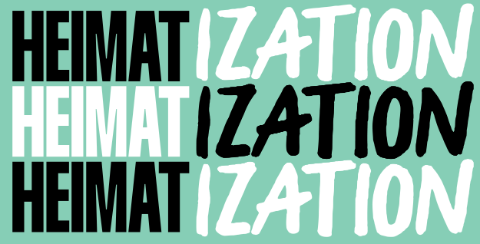
How can a heimat—a so-called homeland—be created? How can different positions and ideas about participation be made productive and effective? Heimatization is based on two interconnected approaches: highlighting the many models of belonging that many people and initiatives have been working on for decades; and countering the resurgence of populist and radical nationalist tendencies with the realities of a pluralistic society.
The Heimatization series of talks sheds light on current cultural and civil society discourse. Actors of plural democracy engage in dialogue with each other, explain their respective perspectives on participation and belonging, and share their experiences—from anti-discrimination and the concept of disintegration to initiatives by Black, Jewish, Sinti, and Roma people, and Antifa groups in Germany. Accompanied by the podcast Who Does Germany Belong To? and the publication series 'haɪ̯maːtn̩ in collaboration with Merve Verlag, the events combine artistic, discursive, and collaborative practices to create a polyphonic dialogue and open it up to a broad audience.
Drawing on Édouard Glissant’s theory of creolization, the term Heimatization describes the cultural interwovenness that enables societies to further develop. It reveals how crucial stimuli that become relevant for society as a whole often emanate from marginalized groups. At a time when these groups are increasingly being suppressed and further marginalized, the project makes often overlooked instances of democratic coexistence visible. It addresses the question of how different perspectives and identities enrich, expand, and transform society. And how a shared future, shaped by everyone, can be imagined.